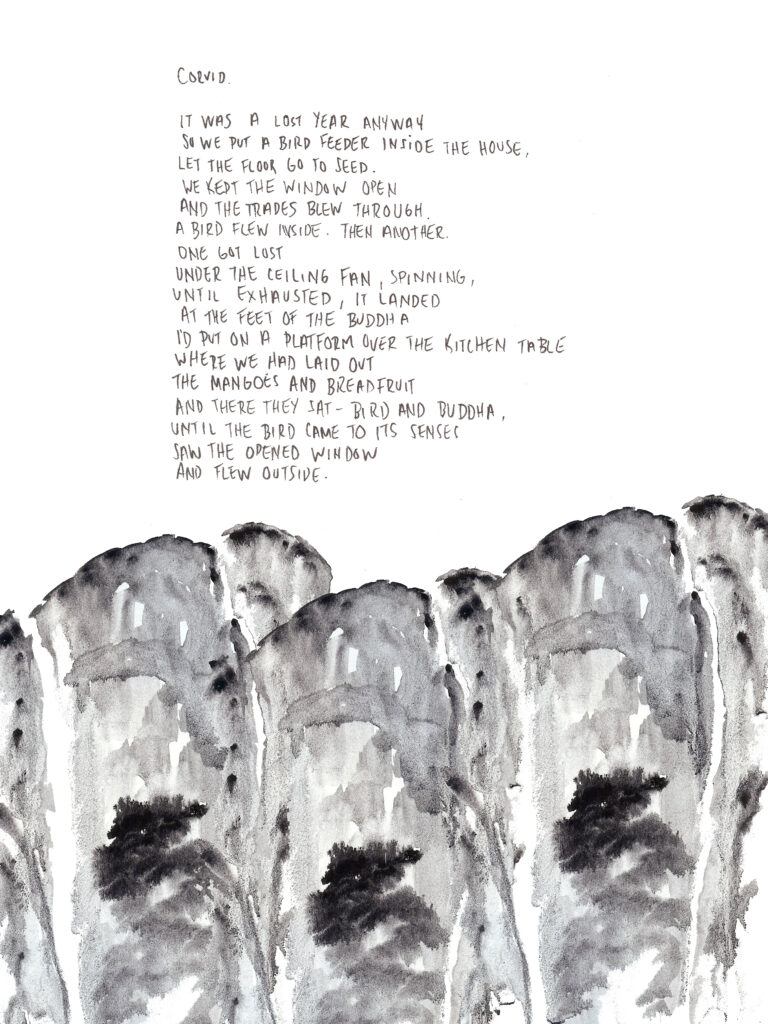
Mental journeys, like physical ones, can be dangerous. It can be helpful to have a guide. The meditative poem can serve as an entryway into altered states of consciousness. This is why I love meditative poetry. The goal of the meditative poem is transcendence. This is achieved through rhythm and incantation.
Really, any poem can be a meditation poem. The act of writing a poem itself is a form of meditation. To be mindful is to pay attention.
Meditation poetry, historically, has been the poetry of pilgrimage and retreat. I think of Han Shan’s hermetic Cold Mountain poems translated beautifully by Gary Snyder (which I review here). These simple and spare poems have the feeling of a well-trodden path through the woods. There’s a sense of familiarity to them when one returns, but also a constant process of discovery. Here is one of my favorites:
“Men ask the way to Cold Mountain
Cold Mountain: There’s no through trail…
How did I make it?
My heart’s not the same as yours.
If your heart was like mine
You’d get it and be right here.”
Han Shan translated by Gary Snyder
The poems of mindfulness, from Han Shan’s perspective, are poems of solitude. But these are not the only poems of meditation. Just as Han Shan’s poems are about the journey inward, Matsuo Basho’s poems from Narrow Road to the Interior are about the journey outward. Basho wrote Narrow Road to the Interior while trekking across the Japanese countryside. The poetry and prose are taken from a journal he kept during the journey.
“The moon and sun are eternal travelers. Even the years wander on. A lifetime adrift in a boat, or in old age leading a tired horse into the years, every day is a journey, and the journey itself is home.
Matsuo Basho. Narrow Road to the Interior. Translated by Sam Hamill.
What’s so delightful about meditative poetry is the way it invites the reader to pause and reflect. I believe that for ancient people, poetry was a means to achieve altered states of consciousness. Chants and songs were invoked to create a rhythmic and trancelike state. The incantatory can be transcendent. Poetry, when read aloud, can result in altered states of consciousness. I theorize that this was the original role of poetry. Today that role has been largely lost, but I don’t think it’s beyond redemption.
Poetry still brings us together in ways no other art form can. Poems are still read at weddings and funerals. The words we choose to mark transitional periods in our lives still matter. Even on the internet, amid the endless scrolling through social media, I find poets calling out into the silence, asking to be heard.
Corvid
It was a lost year anyway
so we put a bird feeder inside the house,
let the floor go to seed.
We kept the window open
and the trades blew through.
A bird flew inside. Then another.
One got lost under the ceiling fan, spinning,
until exhausted, it landed
at the feet of the Buddha
I’d put on a platform over the kitchen table
where we had laid out the mangoes
and the breadfruit.
And there they sat–bird and Buddha
until the bird came to its senses,
saw the opened window
and flew outside.
About the Writer
Janice Greenwood is a writer, surfer, and poet. She holds an M.F.A. in poetry and creative writing from Columbia University.
